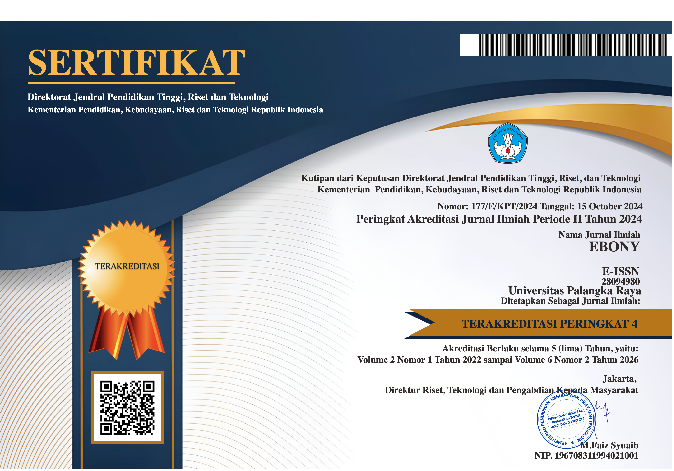A New Paradigm of Language Teaching Methods in ESP Instruction
DOI:
https://doi.org/10.37304/ebony.v4i1.12408Keywords:
ELT Methods, ESP, CBL, PBL, TBLAbstract
The implementation of the Merdeka curriculum, in language teaching requires a specific method that accommodates the curriculum goal. This writing tries to describe the implementation of some language teaching methods used in the Merdeka Curriculum at a higher level of education in English for specific purposes (ESP) context. This article also give recommendation for lecturers to engage Case Based Learning (CBL), Project Based Learning (PBL), Technology Based Learning (TBL) as language teaching methods in ESP instruction considering their advantages to attain Merdeka curriculum goals.
Downloads
References
Alrajeh, T. S. (2021). Project-based learning to enhance pre-service teachers’ teaching skills in science education. Universal Journal of Educational Research, 9(2), 271–279. https://doi.org/10.13189/ujer.2021.090202
Bonney, K. M. (2015). Case study teaching method improves student performance and perceptions of learning gains. Journal of Microbiology & Biology Education, 16 (1): 21–28.
Brown, H. D. (1994). Teaching by principles: An interactive approach to language pedagogy. Prentice Hall Regents.
Büchler, J. P., Brüggelambert, G., de Haan-Cao, H. H., Sherlock, R., & Savanevičienė, A. (2021). Towards an integrated case method in management education—developing an ecosystem-based research and learning journey for flipped classrooms. Administrative Sciences, 11(4). https://doi.org/10.3390/admsci11040113
Care, E., Kim, H., Vista, A., & Anderson, K. (2018). Education system alignment for 21st-century skills: focus on assessment. Center for Universal Education at the Brookings Institution., 1–40. https://onlinelibrary.wiley.com/doi/10.1111/cdev.13673
Chalupa, C., & Haseborg, H. (2014). Improving student motivation through autonomous learning choices. NECTFL Review, 74, 53–85.
Cong-Lem, N. (2018). Online self-regulated learning, internet self-efficacy, and intention to use the internet for language learning. In the Proceedings of the 3rd International Conference on English Language Teaching,121- 130.
Ekawati, Y. N. (2016). The implementation Of curriculum 2013: A case study Of English teachers' experience. ELLD Journal, 7(1), 84–90.
Fauzi, I. (2023). Challenges of english teachers in the digital era. UHAMKA International Conference on ELT and CALL (UICELL), December, 14–15.
Hoffer, E. R. (2020). Case-based teaching: using stories for engagement and inclusion. International Journal on Social and Education Science Es, 2(2), 75–80.
Indriyana, B. S., & Kuswandono, P. (2019). Developing students ’ higher order thinking skills (HOTS ) in reading: English teachers ’ strategies in selected junior high schools. Journal of English Teaching, 5, 204–216.
Jon, R. B., Embong, R., Purnama, B., & Wadi, A. S. (2021). The challenges of English language teaching in Indonesia.International Journal of English and Applied Linguistics. 3, 158–168.
Joynes, C, Serena Rossignoli, and Esi Fenyiwa Amonoo-Kuofi( 2019). 2an 1st Century skills: evidence of issue in definition, demand, and delivery for development contexts. Institute of Development Studies.
Kulak, V., & Newton, G. (2015). An Investigation of the pedagogical impact of using case-based learning in an undergraduate biochemistry course. International Journal of Higher Education, 4(4), 13–24.
Levy, M. (2010). Developing the language skills: aligning the technological tool to the pedagogical purpose. In C. Ward (ed.) The Impact of technology on language learning and teaching: What, how, and why. Regional Language Centre.
Mosier, G. G., Bradley-Levine, J., & Perkins, T. (2016). Students’ perceptions of project-based learning within the new Tech School Model. International Journal of Educational Reform, 25(1), 1-14.
Richard, J. (2015). Technology in language teaching today. Indonesia Journal of English Language Teaching, 10(1), 1-15.
Roell, C. (2019). Using a case study in the EFL classroom. English Teaching Forum, 24-33.
Shin, M.-H. (2018). Effects of project-based learning on students’ motivation and self-efficacy. English Teaching, 73(1), 95–114. https://doi.org/10.15858/engtea.73.1.201803.95
Slater, T., Beckett, G. H., & Aufderhaar, C. (2006). Assessing projects as a second language and content learning. In G. H. Beckett, & P. C. Miller, (Eds.). Project-based second and foreign language education: past, present, and future. Information Age Publishing.
Snyder, H. (2019). Literature review as a research methodology : An overview and guidelines. Journal of Business Research, 104(August), 333–339. https://doi.org/10.1016/j.jbusres.2019.07.039
Topperzer, M. K., Roug, L. I., Andrés-Jensen, L., Pontoppidan, P., Hoffmann, M., Larsen, H. B., Schmiegelow, K., & Sørensen, J. L. (2022). Twelve tips for postgraduate interprofessional case-based learning. Medical Teacher, 44(2), 130-137. https://doi.org/10.1080/0142159X.2021.1896691
Yoo, M., D, P., Park, H., D, P., & Korea, S. (2015). Effects of case-based learning on communication skills, problem-solving ability, and learning motivation in nursing students. Nursing & Health Science, 17(02) 166–172. https://doi.org/10.1111/nhs.12151
Downloads
Published
How to Cite
Issue
Section
License
Copyright (c) 2024 Dewi Surani, Rini Dwi Septiyani

This work is licensed under a Creative Commons Attribution 4.0 International License.











